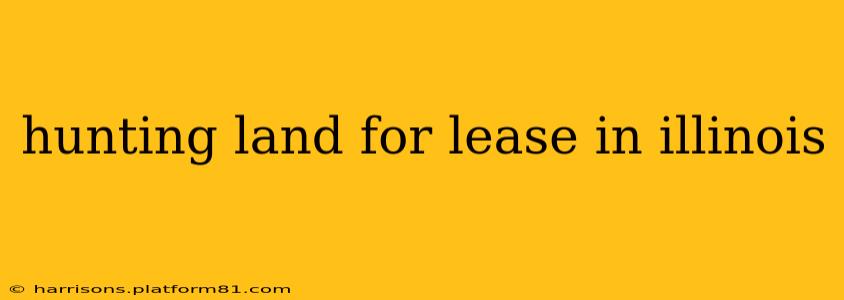Illinois boasts a rich tapestry of hunting opportunities, from sprawling farmlands teeming with deer to the vast wetlands attracting waterfowl. For hunters who don't own their own land, leasing hunting grounds provides an excellent alternative. But navigating the landscape of Illinois hunting leases can be tricky. This guide will help you find the perfect hunting land for lease in Illinois, ensuring a successful and enjoyable season.
How Much Does Hunting Land Lease Cost in Illinois?
The cost of leasing hunting land in Illinois varies significantly depending on several factors:
- Location: Land closer to population centers or with easier access commands higher prices. Rural, less accessible properties are generally more affordable.
- Acreage: Larger tracts of land naturally cost more than smaller ones.
- Game Availability: Areas known for high densities of desirable game species (deer, turkey, waterfowl) tend to be more expensive.
- Amenities: Properties with additional features like food plots, blinds, or established trails will often command a premium.
- Lease Term: Longer-term leases may offer slightly lower per-acre rates.
Expect to pay anywhere from a few hundred dollars per season for a smaller plot to several thousand dollars for a larger, more desirable property. Thorough research is key to finding a lease that fits your budget and hunting goals.
Where Can I Find Hunting Land for Lease in Illinois?
Several avenues exist for finding hunting land for lease in Illinois:
- Online Classifieds: Websites like Craigslist, LandWatch, and other land-focused real estate sites frequently list hunting leases. Be sure to verify the legitimacy of any listings.
- Local Real Estate Agents: Real estate agents specializing in rural properties often have access to hunting land leases not advertised online.
- Word of Mouth: Network with fellow hunters and inquire about available leases in your area. Local hunting clubs or sporting goods stores can also be valuable sources of information.
- State and Private Landowner Programs: Illinois has various programs connecting hunters with private landowners willing to lease their hunting rights. Check with the Illinois Department of Natural Resources (IDNR) for details.
Remember to carefully review any lease agreement before signing, paying close attention to terms, conditions, and liability clauses.
What Are the Best Hunting Seasons in Illinois?
Illinois offers diverse hunting seasons. Popular seasons include:
- Deer Hunting: The firearm deer season typically runs for several weeks in late autumn, followed by archery seasons extending into early winter.
- Turkey Hunting: Spring and fall turkey seasons provide opportunities for both experienced and novice hunters.
- Waterfowl Hunting: Various waterfowl seasons cater to different species, generally extending from autumn to winter.
- Small Game Hunting: Seasons for rabbits, squirrels, and other small game vary throughout the year.
Check the IDNR website for the most up-to-date hunting season dates and regulations.
What Permits and Licenses Do I Need to Hunt in Illinois?
Before you hunt on leased land in Illinois, ensure you have all the necessary permits and licenses:
- Illinois Hunting License: This is required for all hunters.
- Harvest Information Program (HIP) Certification: This is necessary for hunting certain migratory birds, such as ducks and geese.
- Firearm Owner's Identification Card (FOID) Card (if applicable): This is needed if you plan on hunting with a firearm.
- Landowner Permission: Always obtain written permission from the landowner before hunting on their property.
Failure to obtain the required permits can result in significant fines. Consult the IDNR website for complete and current licensing requirements.
What Questions Should I Ask a Landowner Before Leasing Hunting Land?
Before committing to a lease, ask these crucial questions:
- What is the history of game on the property? Gather information about previous harvests and the overall game population.
- What are the specific terms of the lease? Clearly define hunting days, access restrictions, and liability clauses.
- Are there any existing structures or improvements on the property? (stands, blinds, feeders)
- Are there any restrictions on the types of hunting allowed? (e.g., bow hunting only)
- What are the landowner's expectations for maintaining the property? Are there any responsibilities you will need to take on?
Open communication and clarity are essential for a successful hunting lease.
By thoroughly researching, asking pertinent questions, and understanding the regulations, you can successfully secure the ideal hunting land for lease in Illinois, ensuring a rewarding and memorable hunting season. Remember to always prioritize safety and respect the property and the environment.
